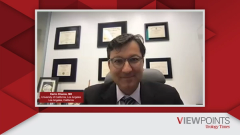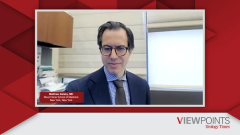
Treatment Journey for a Patient With Bladder Cancer
The types of healthcare professionals who may play a role in evaluating and diagnosing bladder cancer.
Episodes in this series

Leonard G. Gomella, MD: I want to turn it over to Dr Sam Chang to talk about some of the aspects of how we’re diagnosing bladder cancer, the initial process from making the diagnosis—testing, imaging, biopsy—and how we interact with primary care doctors, urologists, and oncologists in this process. Again, Dr Chang has been very involved with guidelines on bladder cancer so he’ll be the perfect one to give us that background, Dr Chang.
Sam S. Chang, MD, MBA: Thanks very much, Dr Gomella. It’s a real honor to be with such a learned panel. I know I’ll gain much more from this than I’ll be able to contribute. This initial evaluation and process of diagnosing bladder cancer is one, we think, it starts from the urologist but actually many times it starts with the primary care physicians. The AUA [American Urological Association] has actually just come up with updated guidelines regarding microscopic hematuria and its proper evaluation and diagnostic approach because we still are finding, I think, bladder cancers at a much later stage than we would like. The next stage of evaluating a patient is diagnose, usually with cystoscopy and biopsy, endoscopic resection (we call it by different names), transurethral resection, but that will give us an idea of not only the histopathologic characteristics but the stage and grade of the tumors that may be present.
Importantly, that will be essential in terms of trying to remove as much tumor that’s actually there. I think understanding everything that is accounted for is essential and Dr Chamie is going to go over kind of what that bladder cancer patient journey is like. I think not only importantly are the AUA guidelines in terms of microscopic hematuria, but as we’ll go through non-muscle invasive and invasive bladder cancer components, the AUA has recently updated their guidelines just last year to help kind of formulate an algorithm that can kind of pattern for our clinicians to help diagnose, treat, and survey our patients with bladder cancer. Dr Chamie?
Karim Chamie, MD: Thank you, Dr Chang. Thank you, Dr Gomella. This is obviously an honor here. Obviously, patients with bladder cancer it’s a significant burden, not only from the perspective of mortality, but one that’s associated with significant recurrences, financial toxicities, pain. Oftentimes, patients succumb to other diseases but in the meantime go through multiple endoscopic resections and treatments. Patients are oftentimes diagnosed with bladder cancer after an episode of gross hematuria or after lower urinary tract symptoms they’re referred to a urologist. We’ve actually examined the role of high-grade bladder cancer, non-muscle invasive bladder cancer and 70% of patients are actually initially diagnosed by community physicians.
These physicians usually do less than 12 transurethral resections a year, which counts to maybe 1 bladder tumor diagnosis per month. They’re often referred to the urologist. The urologist does the resection, and the initial treatments often take place in the community. It’s not until the tumors become more problematic, meaning that they start to recur more frequently or if currently with community physicians having less access to BCG [Bacillus Calmette-Guerin] or other agents, are they actually referred to other academic medical centers. When patients are usually diagnosed with bladder cancer, they tend to refer to urologists and then the referral to medical oncology tends to occur later on as the stage progresses or if they become more advanced. With regard to when patients are referred to medical oncology, Dr Chang when do you see that in your practice?
Sam S. Chang, MD, MBA: Increasingly early. Number 1, the indications for starting systemic therapy has moved sooner and sooner in the disease process. It started with metastatic and more advanced disease but increasingly for our basic cancer patients they’ve become essential in terms of our evaluation of patients, not only prior to cystectomy but in a trimodal or multi-modality factor when we try to spare the bladder with invasive disease. But importantly, with non-muscle invasive disease as we get options now for those patients who don’t respond to BCG we call on our medical oncologist quite a lot. Not only for therapy—using immunotherapy—but to consider for trials that include immunotherapy and other IO [immuno-oncology] type agents.
Karim Chamie, MD: When we’re talking about patients and their bladder cancer journey there’s obviously multiple phases. I mean we have phases where they initially get diagnosed and they’re undergoing ongoing treatment. And most of the time when we’re talking about non-muscle invasive bladder cancer, that’s usually managed by urologists because they have access to the cystoscopes and intravesical agents. Once patients complete therapy, once they’ve completed their BCG, most of the time, if we’re talking about non-muscle invasive bladder cancer again they’re usually just followed by just a urologist. But when the disease is out of control, obviously they get referred to medical oncology. That’s something that is going to be a tug of war in the future as urologists become maybe increasingly more comfortable giving some of these newer novel agents. Will they be referring to medical oncologists? Will they be doing it themselves? And obviously you have radiation oncologists that do their own cystoscopy so obviously there are ongoing shifts there.
Transcript edited for clarity.
Newsletter
Stay current with the latest urology news and practice-changing insights — sign up now for the essential updates every urologist needs.







